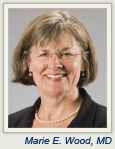 It has been suggested that after completing their treatment, cancer patients can be transitioned to primary care providers for continued “survivorship” care. But at the Best of ASCO meeting, speakers and audience members alike felt survivorship care is the domain of the treating oncologist.
It has been suggested that after completing their treatment, cancer patients can be transitioned to primary care providers for continued “survivorship” care. But at the Best of ASCO meeting, speakers and audience members alike felt survivorship care is the domain of the treating oncologist.
Few hands went up in response to a question from meeting Chair Daniel F. Hayes, MD, “How many of you refer your patients to primary care physicians?” He was not surprised, he said. “The [methodology of the] Canadian study (abstract 9005) would be a major culture shift for us,” he said. The motive for retaining patients is not financial, Dr. Hayes and other oncologists at the meeting insisted. “Economic pressures encourage oncologists to see new patients, especially those who will receive subsequent therapy in their centers. Thus, filling a clinic with long-term follow-up patients may not be economically optimal,” he said.
Keeping up with Patient Needs
“Still, many oncologists have concerns that the complicated problems inherent to our therapies for breast cancer (such as premature menopause and antiestrogenic therapy) may not be appreciated or treated appropriately by primary care physicians,” Dr. Hayes added.
The main concern was the ability of primary care providers to keep abreast of the various unique, and often changing, needs of cancer patients of all types. “Enormous training is required,” Dr. Hayes commented, adding that he has been disturbed to learn, for example, that some primary care providers prescribe estrogen-replacement therapy to treat vaginal dryness in breast cancer patients.
Marie E. Wood, MD, of the University of Vermont, said she has started giving her breast cancer patients a choice of staying with her or transitioning to a primary care physician. “The primary care providers I talk to are nervous,” she added. “They want recommendations and guidelines, and we do give them a care plan,” but she wondered if this is adequate. “I was surprised at the outcome from the Canadian study,” she commented. ■

 Marie E. Wood, MD, of the Familial Cancer Program at the University of Vermont, Burlington, addressed clinically relevant issues in supportive care and survivorship at the Best of ASCO® Annual Meeting ‘11 in Miami.
Marie E. Wood, MD, of the Familial Cancer Program at the University of Vermont, Burlington, addressed clinically relevant issues in supportive care and survivorship at the Best of ASCO® Annual Meeting ‘11 in Miami.